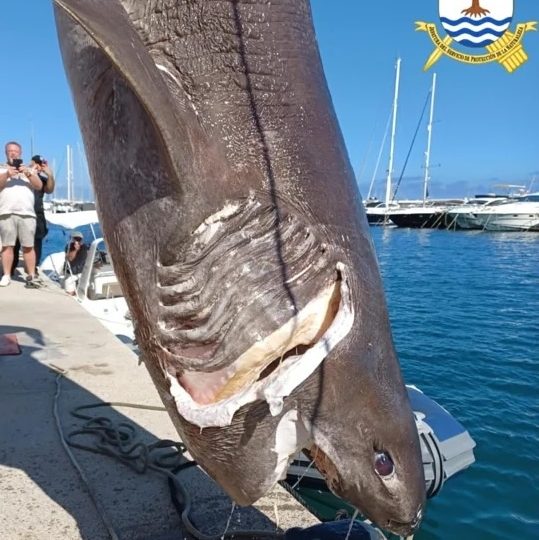A MONSTER 15ft prehistoric shark with six rows of teeth has been found just three miles from Benidorm.
The giant beast was spotted dead in the sea by local sailors off the coast of Altea on Saturday (May 25).
Jam Press/Jefatura del ServicioThe deceased 15ft shark after it was hauled out the water by fishermen[/caption]
Jam Press/Jefatura del ServicioThe prehistoric-looking beast was found off the Spanish coast[/caption]
Jam Press/Jefatura del ServicioThe creature was identified as a bluntnose sixgill shark[/caption]
The fishermen informed authorities of their terrifying discovery and the shark was soon hauled into port at the popular Spanish resort.
Researchers measured the shark and found it to be a whopping (15ft 1in) long.
They also took skin, parasite and tooth samples to study the little-known species further.
The deceased specimen has since been identified as a bluntnose sixgill shark.
Found in tropical and temperate waters worldwide at depths of almost 6,562ft, it is the largest shark that inhabits the seabed of the Mediterranean.
Also known as the cow shark, the beast has six rows of saw-like teeth on its lower jaw and smaller teeth on its upper jaw.
It feeds exclusively on dead animals, although its diet is said to be widely varied by region, and can grow up to 20ft long.
The International Union for Conservation of Nature categorises it as “near threatened”, meaning it may be vulnerable to endangerment in the near future.
The researchers from the University of Valencia hope their samples will help them better understand deep-sea species.
The Spanish authorities say that anyone who spots a stranded marine animal should call 112.
In 2019, terrifying footage showed the moment deep sea researchers come eyeball-to-eyeball with a bluntnose sixgill shark twice the size of their submarine.
Venturing into the waters off Cape Eleuthera in the Bahamas, the team from OceanX dived down to more than 2,624ft below sea level to find the predator.
Two years earlier, a Blue Planet II producer told how an attack by seven 20ft sharks left his crew fearing for their lives.
The BBC1 team were in a submersible nearly half a mile down when the bluntnose sixgill beasts tried to smash it.
Elsewhere, tourists were banned from swimming in the sea at a Menorcan beach earlier this month after a huge shark was seen lurking near the shore.
Concerned coastguards called the emergency services and raised a red warning flag after the fin of the seven foot beast was spotted poking out of the water.
And a Brit tourist mauled by a 10ft shark off a Caribbean beach had to have his fingers re-attached in life-saving surgery overnight.
Peter Smith, 64, was left fighting for his life after he was attacked by a bull shark while swimming off Tobago in April.
Factbox of Sixgill sharks
By Tom Malley
Bluntnose sixgill sharks can be found worldwide but are typically seen in cooler waters.
A stout shark with six gill slits, hence their name, their preferred habitat is deepwater, down to a maximum of nearly 6,562ft.
As a result of them preferring the depths, not a huge amount is known about the beasts.
They are thought to mainly prey and scavenge on small fish, molluscs and crustaceans.
As they grow larger, marine mammals become an increasingly important part of their diet.









